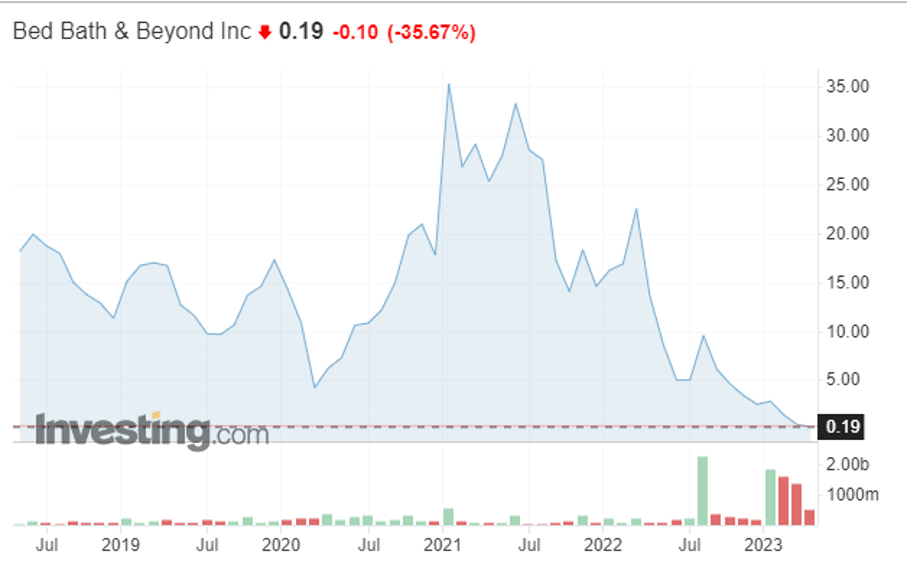Bed Bath & Beyond has filed for bankruptcy protection after years of losses and unsuccessful turnaround plans left the retailer short of cash. Despite attempts to raise funds and close stores to reduce losses, sales continued to decline, and the company's stock price fell below $1.*

Performance of Bed Bath & Beyond stock over 5 years. Source: investing.com
Filing for Chapter 11 bankruptcy, the company plans to close all 360 Bed Bath & Beyond and 120 Buybuy Baby stores eventually. Top lender Sixth Street Partners provided $240 million in financing to help the company during the liquidation process. Bankruptcy allows Bed Bath & Beyond to hold going-out-of-business sales, seek potential buyers for remaining assets, and prioritize debt repayment over shareholder recoveries.
If a bidder emerges during bankruptcy, the retailer may shift from liquidation to a sale. Bed Bath & Beyond's struggles worsened as suppliers stopped shipping goods, and the company faced competition from online retailers like Amazon. Several retail chains have sought court protection, with some continuing to operate stores and others closing down entirely.[1]
Bed Bath & Beyond's co-founders, Warren Eisenberg and Leonard Feinstein, opened the first stores in 1971. Despite initial success, the company started losing customers to rivals and struggled with stocking stores. The rise of online retail contributed to the company's decline, and its recent efforts to replace name brands with private-label goods failed to improve the situation.
The company's store closures will likely impact retail landlords, who are already facing higher interest rates and increased borrowing costs. Founded in 1971, Bed Bath & Beyond grew to operate over 1,550 stores at its peak.
* Past performance is no guarantee of future results.
[1] Forward-looking statements are based on assumptions and current expectations, which may be inaccurate, or based on the current economic environment which is subject to change. Such statements are not guaranteeing of future performance. They involve risks and other uncertainties which are difficult to predict. Results could differ materially from those expressed or implied in any forward-looking statements.

April 2025 showed just how quickly markets can plunge because of policy decisions and how quickly they can react when a glimmer of hope emerges. President Trump's new tariffs were the main cause of nervousness, but the corpor...
The U.S. Department of Justice (DOJ) has intensified its antitrust battle with Google, proposing drastic measures to curb the tech giant's dominance in online search and advertising. Central to these remedies is the demand that Goo...
Fox Corporation (NASDAQ: FOXA) delivered an impressive Q3 CY2024 performance, exceeding market expectations with a revenue increase of 11.1% year-over-year, totaling $3.56 billion. This revenue surpassed analysts' predictions by 5....



